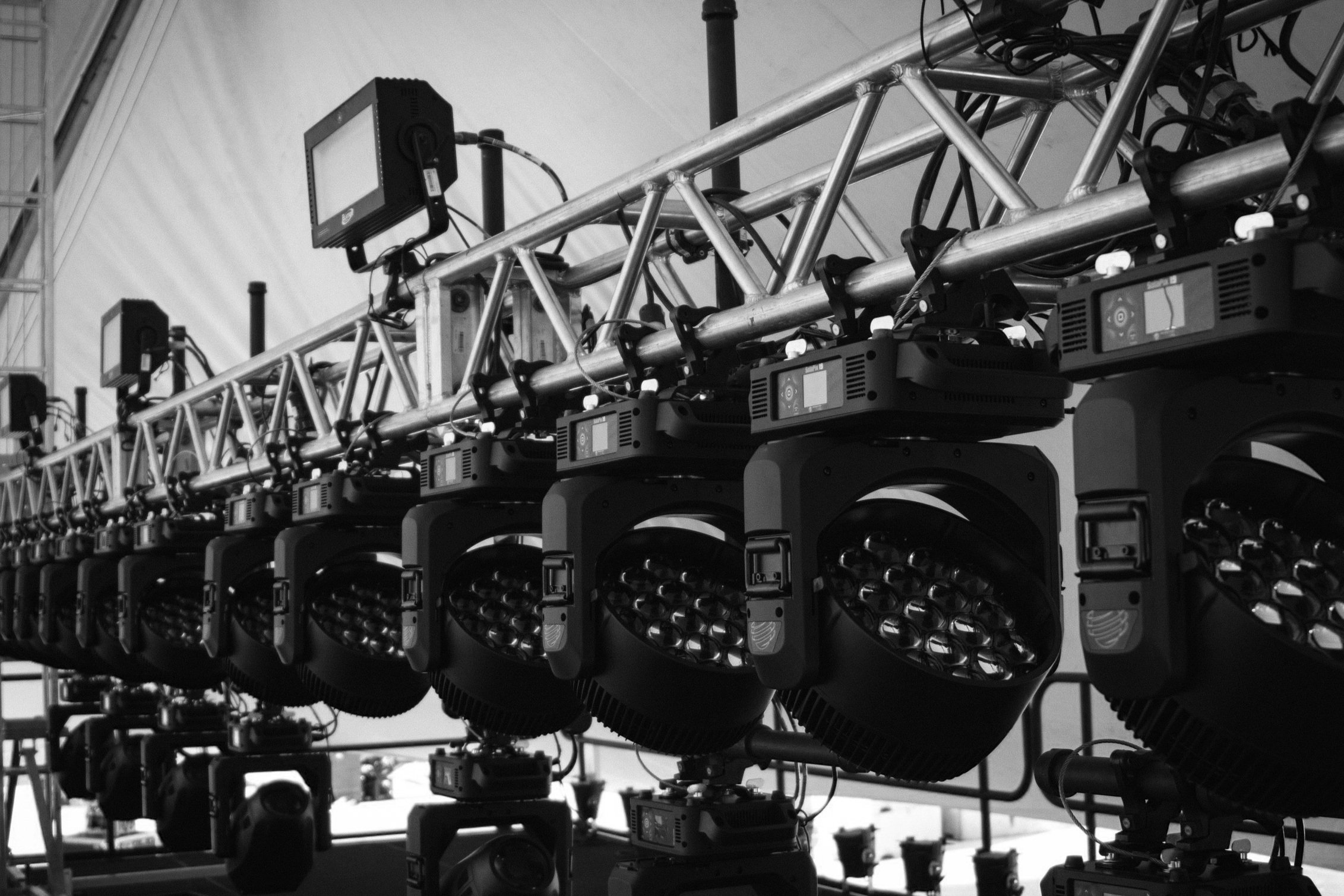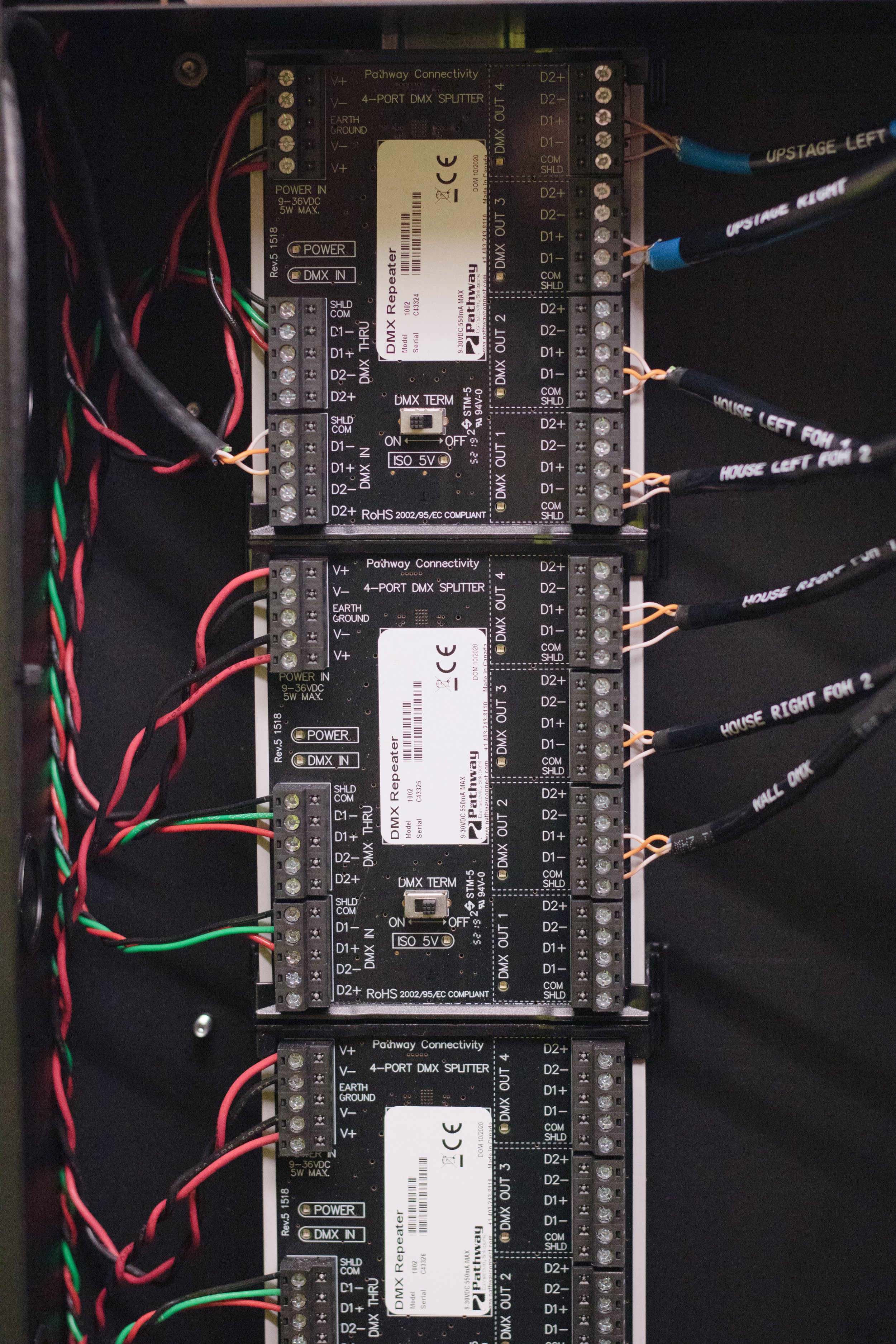
BLog
We want to share our knowledge and help you!
What electrical work can (and can’t) I do in my own building?
I thought it might be helpful to share some of the tidbits of information I’ve learned over the past 18 years as an installer and Master Electrician with the State of Washington. Lots of venues, especially non-profits, have been trying to figure out more cost-effective ways to get their installations done, and I’ve had to do huge amounts of research into this subject as a qualified installer helping them figure it out.
Why You Should Keep Your Equipment Clean
You just spent thousands on new stage production equipment and anticipate long-lasting uninterrupted service, right? Well, that only happens in a perfect world, and let's face it, we are far from that. However, there are things you can do to minimize your downtime and optimize the life of your equipment. One of the most important, yet overlooked steps you can take is implementing a regular maintenance program. In other words, CLEAN YOUR GEAR!!! When your equipment is hung overhead, tucked in a back closet, or inside of an equipment rack, it’s easy to fall into the “out of sight, out of mind” mentality, but it is crucial for the longevity and reliability of your stage gear to keep it clean.
Do I Need a Line Array for my Event / Venue?
When line arrays started becoming more available a couple of decades ago, it seemed like everyone wanted one. No one really understood how they work, but we all thought it was the latest, greatest technology, so they became very popular. They sounded good and they made touring easier because they could adapt to lots of different seating configurations. But are they appropriate for all venues?
d&b Audiotechnik KSL Line Array
We are proud to announce that VIP Production Northwest just took delivery of the FIRST d&b Audiotechnik KSL Line Array in the Pacific Northwest (excluding Canada).
The SL-Series from d&b is the state-of-the-art line array system in the audio industry. Its technology, feature set, and rider friendliness are unmatched. With this system, we can provide the highest level of world-class audio in any venue in the area.
The Projector Predicament
Whether you’re a school or house of worship looking to spend the big dollars on a projector, getting the best projector for your needs feels important. But with this brand, that brand, lasers, lamps, brightness, colors, and blah blah blah, it get can get confusing. All that being said, I’m going to go over three types of projector pros and cons, and give you, our dear reader, a list of questions to ask when you’re in the projector predicament.
Hiring a Production Company 201
Planning an event can be daunting, especially for those who have never done them before. There are so many details to think through, and if you have no experience with rental houses and production companies, how do you know who you can trust?
Triston did a great job of outlining the basics of production needs and considerations in his blog “Hiring a production company 101” and I’d like to take that a few steps further to help you avoid some of the pitfalls we’ve seen that wreak havoc on events. Asking a few questions can sometimes make the difference between disaster and a successful event.
How Basic Uplighting Can Transform Your Event
Let’s start with the basics: What is uplighting?
For some of you, this may be obvious, and the title itself may be pretty straightforward, but to those who have never used the technique, I’ll give you a textbook definition. Uplighting is when you use lighting from below to illuminate upwards on a surface, or something that might be a point of interest that you want people to see. Most often the fixtures are placed on the ground, but not always.
What Is RDM?
Have you ever been setting up lighting for a concert or event, started programming, and noticed that one of your stagehands or volunteers (or let’s be honest, it was probably YOU who screwed the pooch on this one) has set a DMX address or mode incorrectly on a fixture? Now you have to find a way to get to a light that is now more than likely impossible to access, just to change one small setting that you should have noticed earlier!! Well, let me introduce you to Remote Device Management, otherwise known as RDM.
Networking For Production
In the past few years, production technologies have made a strong move toward IP (Internet Protocol) networks as a transport for audio, video and lighting signals and controls. Audinate’s Dante has emerged as the standard for transmitting audio over standard IP networks, video isn’t far behind, and we’ve been doing remote controls for consoles over wireless networks for years now. Knowing something about networking is essential to keeping up with the progress in today’s connected production systems. Unfortunately, the bits and bytes we use to make networks work are confusing if you have no experience with them. This article is my attempt to get you the basics that you’ll need to navigate an IP connected world.
The Cost of Quality
To get quality results ends up costing more money in the long run when you have to sell off the cheap equipment and purchase better equipment. Not to mention the time and headaches involved in trying to make the cheap stuff work, or dealing with repairs that take forever.
Consider instead, if you buy quality speakers that are properly amplified, tuned, and oriented, use a mixing console with something better than cheap preamps, and buy industry standard microphones that are placed properly, you’re not handicapping your volunteer audio person from the start. In fact, you’ve greatly improved their chances of being successful, and it doesn’t have to be crazy expensive.
Hiring a Production Company 101
Many people are intimidated by the thought of reaching out to a production company. You’ve spent all this time organizing and planning your event, and now it's time to reach out to your local production company. You don’t want to seem like you know nothing, so what information should you have on hand? As a production manager, I see a lot of people following this mentality. I’m here to tell you not to worry, you don’t have to know every little detail! A good production company will be the experts for you, and can help you understand everything needed to make your vision come to life. Hopefully this quick guide will provide you with the knowledge and confidence on what you should have prepared when reaching out.
Gobos:101
Gobos are used with ellipsoidal or spot theatrical fixtures to create lighting scenes on stage. Simple gobos, incorporated into automated lighting systems, are also popular especially at nightclubs and other musical venues to create moving shapes. They may also be used for architectural lighting, as well as in interior design, as in projecting a company logo or message on a wall.
How Loud Should Your Church Service Be?
For the 30+ years that I’ve been mixing live shows and church services there is one thing that remains constant: you can’t please everyone. Inevitably, at nearly every show and service, someone will complain that they can’t hear something or that it’s too loud. It wasn’t because I sucked; I get lots of compliments from musicians who like the way I mix. If someone is going to disagree with what you’re doing in church, I guarantee the #1 request will be to turn it down.
Microphone Selection & Placement - A Quick Reference
One of the most commonly asked questions I get as an audio engineer is regarding what mic to use for a specific application. Unfortunately, there are as many opinions about that question as there are audio techs in the field. There are also about the same number of mics available to choose from. What follows is a compilation of my experience with a variety of mics that are both industry standard and, in most cases, affordable. I’m sure lots of people will want to argue and I’ll hear about all the little nuances and esoteric mics that I missed. Good thing I’m always open to trying new techniques!
Gain Staging - the Missing key to a great mix
Without a doubt, the number one issue I find in venues is a lack of understanding of proper speaker placement, the second most common issue is a lack of understanding of gain staging and why it’s important. It’s the bedrock of a good mix and a critical component to avoiding a couple of other common issues.
Proper Speaker Placement
Without a doubt, the number one audio issue I see in churches and small venues is speaker placement, and more accurately, pointing your speakers in the right direction. Fortunately, this is also one of the easiest issues to fix, if you know what to look for.
Should you hang that? - A Rigging Primer
Speakers work more efficiently when hung, lights wouldn’t light very well if they could only be set on the floor, and you couldn’t see a video screen very well if it wasn’t suspended in some way. In the production world, hanging things–whether from existing structure (the building) or by building additional structure–is called rigging, and we do it all the time. While procedures exist for making sure the resulting product is safe, that doesn’t mean everyone follows those procedures, or is even aware that there is a procedure.
Fixing Wireless Microphone Dropout
When you understand the technology behind the wireless devices we use, it becomes easier to troubleshoot dropouts. Follow the guidelines in this article to clear up your wireless dropout issues and don’t be afraid to reach out to your local dealer to ask for help.
How Good In-Ear Monitors can Protect Your Hearing!
It wasn't that long ago that the traditional way to hear yourself on stage was through speakers laying all over the stage. The goal was to get it as loud as possible without creating feedback so you could hear yourself over all the noise around you. As a musician, your hearing is one of the most vital aspects to being able to do your job well. With all that sound beating on your ear drums at high volumes, is it surprising that this environment consistently leads to permanent hearing loss?
But what if I told you that you could protect your hearing AND have the best monitor mix you've ever heard?



















